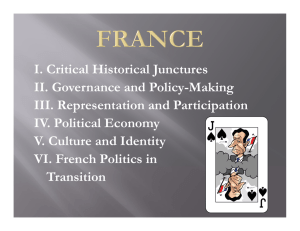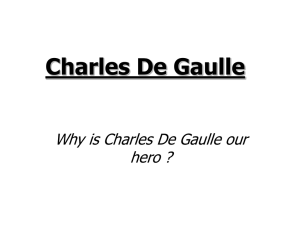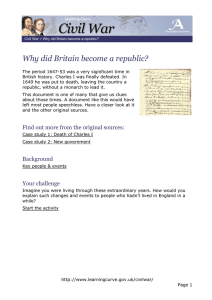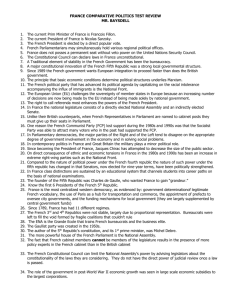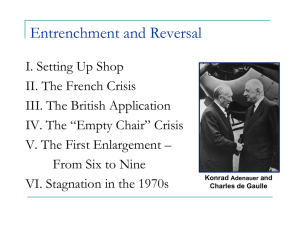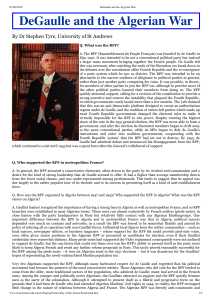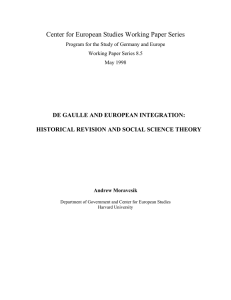Fourth Republic The End of the Thirty Years War of the 20 century
advertisement
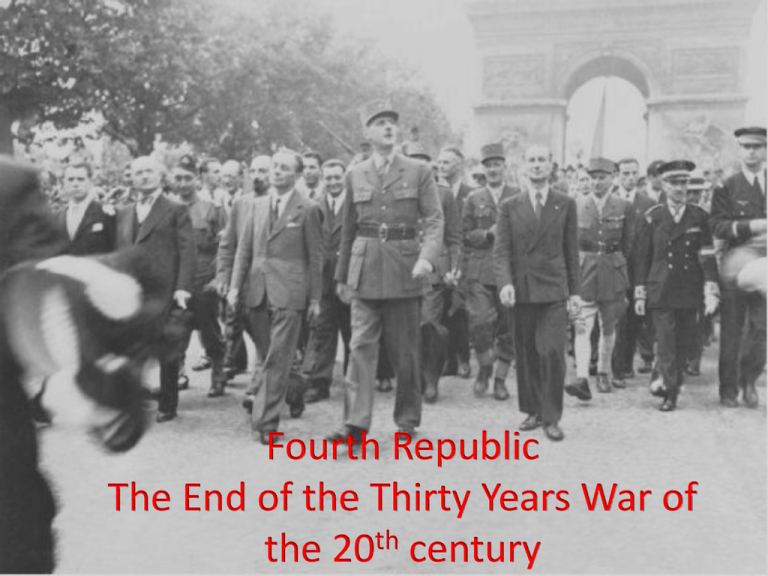
Fourth Republic The End of the Thirty Years War of the 20th century Ouradour sur Glane • http://www.youtube.com/watch?v=5TwrwJJ3 G6w Postwar Politics • ‘From resistance to revolution’? – Revolutionary Left tries to seize the occasion to direct postwar politics – ‘They’re on the train for 1984, thinking it was 1848’ • Quip of British journalist – Communist Party – apogee of influence • USSR seen in a positive light (even by the conservative Catholic De Gaulle) – De Gaulle oversaw Constituent Assembly until January 1946 – dissatisfied with role for executive – 4th Republic founded in October 1946 • Limited executive authority, much like in the 3rd Republic… Postwar Politics • Vichy authorities and collaborators attacked – Lower purge rates than in Belgium and Netherlands – Body counts • Rumors: 120K • Reality: probably 10-12K – Compare this to 15-30K during the Terror • 39K sentenced; 40K stripped of civic rights • 95K sentenced to ‘Civic Death’ • 2K sentenced to death, only 700-800 were carried out – Pétain: death sentence commuted by De Gaulle – Laval: shot before a firing squad • The political ‘deck’ is cleared. Executions of Collaborators Les tondues Women suspected of sleeping with Germans Les tondues Postwar Politics • De Gaulle founds RPF party: center-right – Rassemblement du Peuple Français • Out of power, he and his party gain influence over the course of the early Fourth Republic • Ancestor of the RPR and UMP Fourth Republic, 1946-1958 Unpopular, despite progress • Referendum on Constitution – 1/3 Support it – 1/3 Reject it – 1/3 Don’t vote – Inauspicious founding! – Goal of constitution: reconcile parliamentary democracy with ministerial stability – failure: 24 different governments during 4th Republic Progress • Progress – Women get the right to vote • Résistantes!!! • Communist Party supports this (as does USSR) • Pushed by women delegates of the government-in-exile (run by De Gaulle in Algiers) – Side note: notice the logic of citizenship rights – One gets them for giving and sacrificing, not for being human Economic Progress • After initial hiccups (1945-1948), dramatic economic growth • Trentes glorieuses (late 1940s to the 1974 oil crisis) • Higher economic growth than in UK – – – – – Index of growth France 1938 = 57 1967 = 155 UK 1938 = 67 1967 = 133 Why different growth rates? Empire cost a lot; UK taxes were lower, so not as much public spending on infrastructure; welfare spending was lower than in France – less of a ‘New Deal’ in UK than in France A mixed economy • State took control of – largest banks – Renault auto factories (whose owner was a collaborator) – Gas, coal, steel and electricity – Airlines • State planning and cultural subsidies Origins of the mixed state? • 1930s – Popular Front – Christian Democrats – Catholics (pro-natalist) • Vichy Years – Technocrats • Post war – Desire to use state institutions as ballast in otherwise turbulent political waters – Social security (like NHS, but different) State institutions to study and manage society • L’ENA -Ecole nationale d’administration – Sciences Po: not a grande école but a grand établissement: feeder for ENA • L’INSEE - Institut national de la statistique et des études économiques • L’Institut national d’études démographiques • State planning Culture • Ministry of Culture (André Malraux) – Created in 1958 • De-centralisation of theatre: much funding for performance art (eventually, special unemployment benefits for this group) • State funding for TV, film industry, radio Different legacies of the social-cultural state • USA/UK – Neo-liberalism – Structural readjustments (austerity) – Privatisation • France – Such institutions had support from the left and the right, the Popular Front types, conservative Catholics and Vichyites… International Organisations • United Nations – Stronger than League of Nations – International security – Freedom and self-determination • Security Council – US, UK, USSR, France, Republic of China (permanent members) • War crimes, Universal Declaration of Human Rights Cold War (4th and 5th Republics) • North Atlantic Treaty Organisation, 1949 – Protect Western Europe from USSR – France’s relationship with Britain and US tense – Strong pro-USSR sentiment in certain French sectors – De Gaulle wants freedom to negotiate with Eastern Europe – France gradually withdraws from NATO (19591966), but secretly agrees to return to NATO should East-West hostilities break out NATO Post War Colonial Crises • Atlantic Charter (1941) and United Nations Charter (1945) – Right to self-determination • UN Charter: ‘To develop friendly relations among nations based on respect for the principle of equal rights and self-determination’. • Principle is left vague Colonial Crisis I – Indochina • French controlled: 1887 to 1954/6 • Japanese controlled in WWII, until Aug 1945 • WWII: US support Ho Chi Minh against Japanese control • Viet Minh = communists and nationalists • Battle of Dien Bien Phu (1954): France defeated in dramatic pitched battle • France gives up Indochina in 1956 Colonial Crisis II – Algeria • Controlled by France since 1830 • Independence movements rise after WWII, despite promises of extending rights – FLN (Front de libération nationale, 1954) • Pieds noirs (colonists) fight to keep French Algeria • More on Algeria, De Gaulle and the fall of the Fourth Republic in Week 9 Intellectual Currents 1950s and early 1960s • Existentialism and variants (Sartre, Camus) – Free will, ethics, humanism, despite the world’s absurdity and inability to predict or even control cause-effect relations, permanent anxiety, existence over essence… For Sartre, tragedy resides in systems; for Camus, it resides in people and the inability for language to bind people together (he was proto-post-structuralist..) • Marxism (Historians, Communist Party strong) – Often looked to USSR, though Sartre was pushed towards a more hardened socialism by the horrors of capitalism and racism in America – Decolonisation (more in two weeks on this) – Interested in binaries, class struggle, social oppression and the material-economic bases of inequality Intellectual Currents 1950s and early 1960s • Structuralism (Claude-Lévy Strauss) – Seek underlying structures of society • Annales School on history (Fernand Braudel) – Histoire totale, longue durée, material development Leading Intellectual/Political paradigms • Marxism (Sartre) • Conservativism (Catholicism, Gaullist, Poujadisme) • Liberalism (Raymond Aron)
